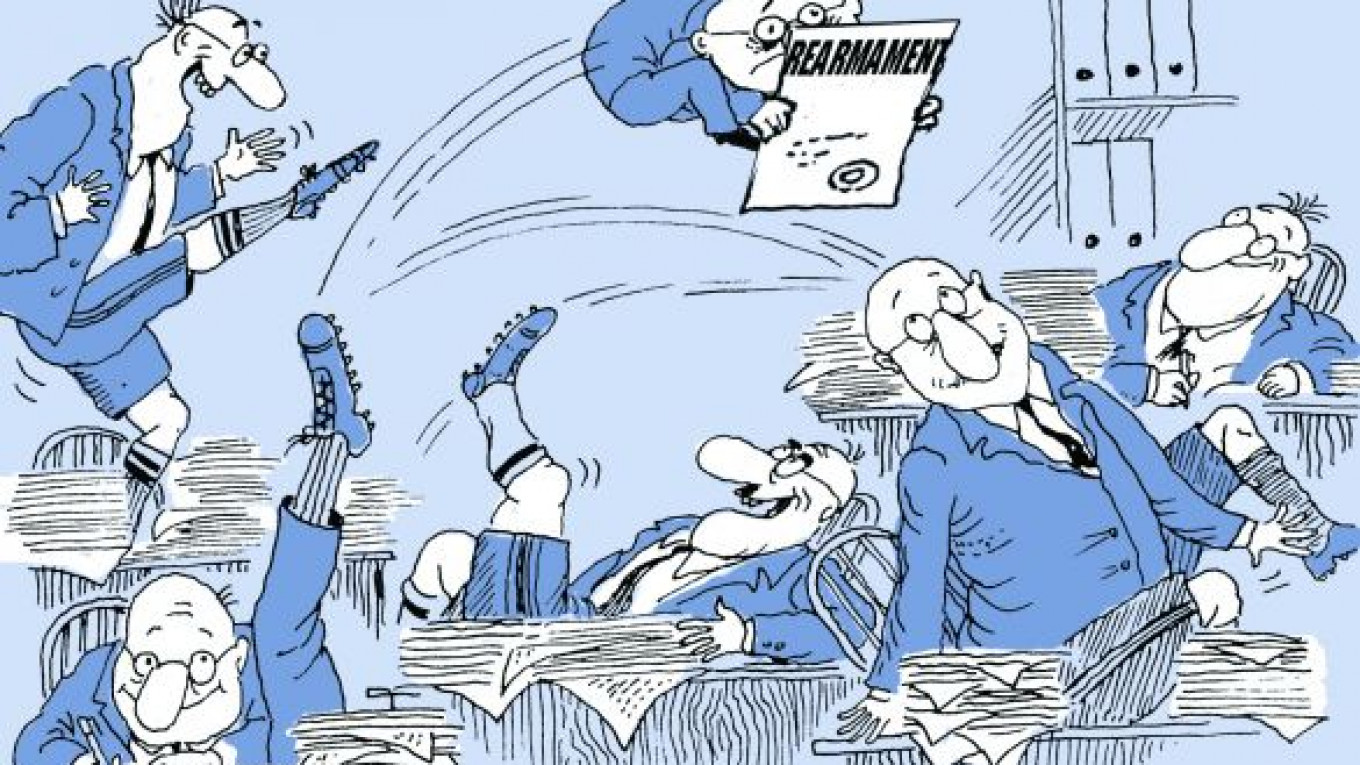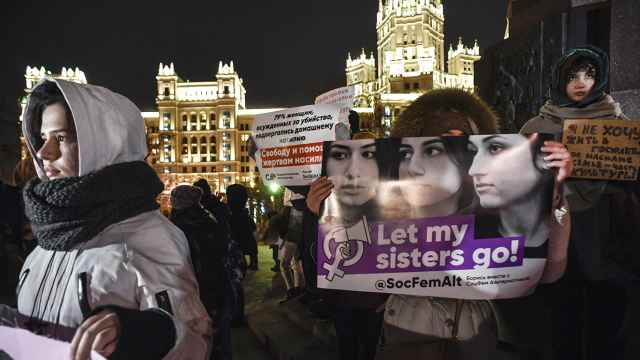Nobody seems to have noticed the latest sensation. On July 29, during a meeting with members of the military top brass, President Vladimir Putin basically admitted that the ambitious government program, which was supposed to allot 20 trillion rubles ($650 billion) for rearming the military through 2020, had failed.
As usual, this type of admission was not made directly but done in bureaucratic newspeak. While opening the July 29 meeting, which discussed the fulfillment of state orders for the Navy, Putin said: “I know that there were plans to make adjustments to the existing state armament program for the financing of ships to be commissioned by 2015. For ships with deadlines after 2015, the amount of funds would be determined in the next state program through 2025. All of this is possible.”
Putin all but admitted that the ambitious $650 billion program for rearming the military through 2020 had failed, and the authorities have little idea of how to save it.
It seems that Putin has grasped the real problems of the defense industry. It turns out that they do not stem from the self-interest of the owners of private defense companies, nor the lack of discipline in those implementing orders. According to Putin, the reasons for the inability to finish new ship construction on time boil down to “the ineffectiveness of interaction between government customers and defense organizations, disruptions in the supply of components from enterprises, poor cooperation between manufacturing and design organizations, and the sometimes poor quality of the supplied equipment.”
This is basically a verdict against the way the defense industry was organized by Putin himself and former Defense Minister Sergei Ivanov, when they created large defense-industry holding companies. They quickly became inefficient and bureaucratic, just like when Soviet Defense Ministry ran the sector.
The “disruptions in the supply of components” mentioned by Putin are a direct result of the collapse of the Soviet defense industry. During the Soviet Union, the bulk of components for military products were manufactured in civilian plants. The Josef Stalin-era model for industrialization rested on the concept of building enterprises for the production of civilian goods and producing military goods at those enterprises, which naturally affected the quality and price of civilian goods.
In reality, Soviets who bought pants from the “Bolshevik garment factory” or a refrigerator from a Minsk factory were actually funding the production of parts for missiles and nuclear submarines. But by the early 90s, most of Soviet industry had collapsed along with the Soviet Union. Part of the defense industry was restructured to produce other goods. Today, owners of these businesses don’t need defense orders to survive, and the attempt to fulfill them would inevitably make their core product range more expensive and therefore less competitive.
Deputy Prime Minister Dmitry Rogozin, who is responsible for the defense industry, had an explanation at the ready: It turns out that former Defense Minister Anatoly Serdyukov is to blame for the disrupted supply of component parts and their poor quality. After all, it was Serdyukov who supposedly resisted the takeover at the relevant enterprises. Yet Rogozin cannot explain how the deficit of component parts and the low quality of the program thwarted implementation of the defense program overseen by the current head of the presidential administration, Sergei Ivanov.
Manufacturers of sophisticated military equipment face a difficult choice. They can, in a semi-artisan way, produce component parts at final assembly plants. Or they can buy them on the side, risking getting a shoddy piece of work made in some barn. It is vital to create complex chains of subcontractors. Even if you have plenty of money, this is no small task. It really is a question of developing new enterprises. But just what kind of new enterprises?
It’s unlikely that Stalin’s production model would work today — that is, creating civilian enterprises that produce military products on the side. In that case, it would be necessary to leave the World Trade Organization, prohibit all imports and introduce an economic “iron curtain,” which could not exist without political isolation as well. Only under these conditions could citizens be forced to buy Russian-made products.
The other option is to build specialized plants for the production of component parts for the defense industry. But that would be terribly expensive. Only a few select major weapons systems would be chosen to complete this task. In my opinion, these would include communications systems, drones and precision-guided weapons, vivid examples of where Russia has been lagging behind industrialized countries for decades.
The other issue is whether new tanks and armored personnel carriers are really necessary for the Armed Forces, or should the appetites of Uralvagonzavod and Kurgan be satiated by modernizing existing weapons systems? Russia must choose what its top priorities are for weapons systems and make the difficult decision of giving up other programs that are less vital. This will inevitably provoke attacks by lobbyists of a bloated military-industrial complex, who will claim that curtailing mass production of tanks, machine guns and fighter jets will only serve the interests of Russia’s enemies. Thus, the attempt to begin serial production in the defense sector puts Rogozin in an extremely difficult position.
In the end, Rogozin has no other choice but to delay the decision to fulfill Putin’s promise to implement serial production. There is only one way out of this problem: buying time by tabling the implementation of these ambitious plans until the next weapons-modernization program is announced. Rogozin spoke openly about such plans after the meeting: “We actually discussed the state armaments program for the years 2016-25.” With that, the rearmament of the Russian military has once again come full circle — and with no results to speak of.
Alexander Golts is deputy editor of the online newspaper Yezhednevny Zhurnal.
A Message from The Moscow Times:
Dear readers,
We are facing unprecedented challenges. Russia's Prosecutor General's Office has designated The Moscow Times as an "undesirable" organization, criminalizing our work and putting our staff at risk of prosecution. This follows our earlier unjust labeling as a "foreign agent."
These actions are direct attempts to silence independent journalism in Russia. The authorities claim our work "discredits the decisions of the Russian leadership." We see things differently: we strive to provide accurate, unbiased reporting on Russia.
We, the journalists of The Moscow Times, refuse to be silenced. But to continue our work, we need your help.
Your support, no matter how small, makes a world of difference. If you can, please support us monthly starting from just $2. It's quick to set up, and every contribution makes a significant impact.
By supporting The Moscow Times, you're defending open, independent journalism in the face of repression. Thank you for standing with us.
Remind me later.







